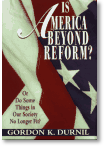
by Gordon Durnil
Sligo Press
ISBN: 0-9651213-9-9
$26.95

Yet another book has been published bemoaning the well-known laundry
list of problems facing our nation: media bias, lobbying tactics, low
voter turnout, lack of character or accountability in high political
office, increasingly limited freedom of religion, environmental
pollution. The problems aren't the revelation of this book, though. That
honor is reserved for the question its author, Gordon Durnil, asks in
response: Is America beyond reform?
Few are comfortable with Durnil's question. Politicians on the left are
reluctant to admit that the America they spent 50 years "reforming"
might need another one. And conservatives, while painfully aware of the
need for reform, are unwilling to accept that America might be beyond
hope.
Without giving away the ending, it should be noted that Durnil, an
American optimist of Reagan's time and voracity, is not so sure his
positive attitude is still warranted. He can remember an America when
men were proud to die for their country in the defense of freedom, when
policemen used the Bible to correct juvenile delinquency, when political
hopefuls took the time to understand and listen to their neighbors.
That's because he was born before the Baby Boomers began to influence
the politics and culture of our nation. And who wouldn't be pessimistic
after living through that?
But the members of Generation X have no collective memory of Durnil's
time, and can only marginally appreciate his account of post World War
II America. That's too bad, considering that this most conservative
generation since the '20s is probably the only group poised to bring
about the reforms that Durnil lays out. What bonds Durnil, then, to the
actors his play requires is that he shares with them an understanding of
the law of inevitable change. He accepts that radicals had this law on
their side in the 1960s when our current status quo was born -- an act
of change Durnil terms "shifting into neutral." It's ironic that
conservatives, usually defined as wanting to preserve the status quo,
are those Durnil now sees as bearing the responsibility for change. And
for Durnil, that means changing it all back.
In assessing how we might change it back, he lays out some unlikely
arguments for a conservative. He worries that big business is just as
much a threat to our concept of free markets as big government. He would
defend the environment from irresponsibile businesses just as he would
from ineffective government policies. He blasts "commercial
conservatives" and makes a distinction between ideology and truth.
And yet, he never waivers in his belief of free market economics, the
sovereignty of the individual, or the basic tenet of individual freedom.
For an old curmudgeon, Durnil possesses the voice of modern
conservatism; a voice that's honest about our past mistakes, passionate
about the misdirection of liberalism, accepting of the new problems that
now face us and open to even newer and more radical conservative
solutions.
By trade, Durnil is an attorney and civil mediator. That means he can
make a damn good argument, but knows how to listen to both sides of a
story. In 1995 he published The Making of a Conservative
Environmentalist and shattered the greenies' perceptions of a
distinguishly graying pin-striper. In his latest book, he further
extends his theme of good-sense environmentalism -- sans the socialism
that pervades the die-hard movement today -- pointing out that
conservative Republicans have no ideological argument with
responsibility toward the environment.
As he's found, some members of the GOP bristle at such a suggestion. But
blame it on the mediator in him, his ability to dowse those small
patches of common ground in enemy territory. In fact, we find in his
description of touring Washington with the pony-tailed leader of
Greenpeace, Jack Weinberg, probably the best example of Durnil's hope
for America: a return to the days of cooperation.
Copyright
© 1997-1998 Stephanie Herman. All rights
reserved. It may not be reproduced with out specific consent of the
author.
